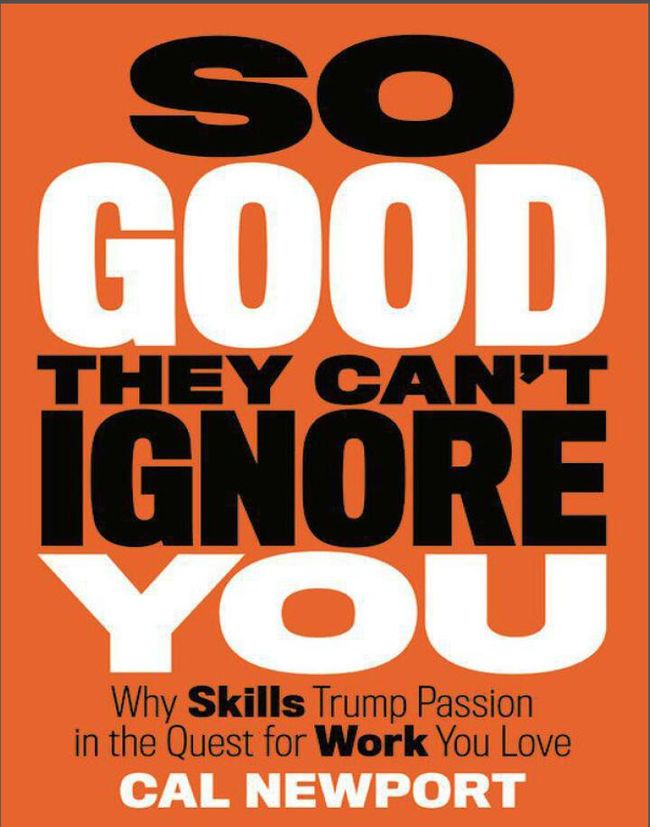The Career Capital Theory of Great Work
1:The traits that define great work are rare and valuable.
2:Supply and demand says that if you want these traits you need rare and:valuable skills to offer in return. Think of these rare and valuable skillsyou can offer as your career capital.
3:The craftsman mindset, with its relentlessfocus on becoming “so goodthey can’t ignore you,” is a strategy well suited for acquiring careercapital. This is why it trumps the passion mindset if your goal is tocreate work you love.
如何做到优秀到不能被忽视
Step 1: Decide What Capital Market You’re In
你处于什么资本市场
When you areacquiring career capital in a field, you can imagine that you are acquiring this capital in a specific type of career capital market.
There are two types of these markets: winner-take-all and auction.
In a winner-take-all market, thereis only one type of career capital available, and lots of different peoplecompeting for it.
Television writing is a winner-take-all market because all that matters is your ability to write good scripts. That is, the only capital typeis your script-writing capability.
赢家通吃市场:只有一种职业资本,而许多不同人竞争同一个方向。比如电视编剧就是个赢家通吃的市场,只关乎你你的写作能力。
An auction market, by contrast, is less structured: There are many different types of career capital, and each person might generate a unique collection.
竞拍市场:构成就没那么固定了,会有很多种不同类型的职业资本,可能每个人都有自己的特殊技能。
With this in mind, the first task in building a deliberate practice strategy isto figure out what type of career capital market you are competing in.
Step 2: Identify Your Capital Type
确定资本类型
Once you’ve identified your market, you must then identify the specific typeof capital to pursue.
一旦你确定了你的市场,就要确定要最求的特定的资本类型。
If you’re in a winner-take-all market, this is trivial: By definition, there’s only one type of capital that matters.
如果是赢家通吃市场,只要一种资本重要。
For an auction market, however, you have flexibility. A useful heuristic in this situation is to seek open gates—opportunities to build capital that are already open to you.
如果是竞拍市场机会相对灵活。
The advantage of open gates is that they get you farther faster, in terms of career capital acquisition, than starting from scratch.
In other words, it’s hard to start from scratch in a new field. If, for example, Mike had decided to leave Stanford to go work for a private sustainability non-profit,he would have been starting at the ground floor with no particular leg up. By instead leveraging his Stanford education to gain a position with a Stanford professor, he was acquiring valuable capital much sooner.
Step 3: Define “Good”
定义什么是“好”
It’s at this point, once you’ve identified exactly what skill to build, that you can, for guidance, begin to draw from the research on deliberate practice. The first thing this literature tells us is that you need clear goals. If you don’t know where you’re trying to get to, then it’s hard to take effective action.
一旦你确定要发展什么技能,首要事是要有明确的目标。
Geoff Colvin, an editor at Fortune magazine who wrote a book on deliberate practice, put it this way in an article that appeared in Fotune: “[Deliberatepractice] requires good goals.”
Step 4: Stretch and Destroy
伸展和破坏
Doing things we know how to do well is enjoyable, and that’s exactly the opposite of what deliberate practice demands…. Deliberate practice is above all an effort of focus and concentration. That is what makes it “deliberate,” as distinct from the mindless playing of scales or hitting of tennis balls that most people engage in.
把事情做好还不够,你还需要走出自己的舒适区,进行伸展,才有机会变的更好。
If you show up and do what you’re told, you will, as Anders Ericsson explained earlier in this chapter, reach an “acceptable level” of ability before plateauing.
The good news about deliberate practice is that it will push you past this plateau and into a realm where you have little competition.
The bad news is that the reason so few people accomplish this feat is exactly because of the trait Colvin warned us about: Deliberate practice is often the opposite of enjoyable.
通过刻意练习,你会通过高原区,而后进入少有对手的水平。但是大部分人是无法做到的,因为可以练习是与享受相对立的。
Stretching is the precondition to getting better.
This is what you should experience in your own pursuit of “good.” If you’re not uncomfortable, then you’re probably stuck at an “acceptable level.”
Pushing past what’s comfortable, however, is only one part of the deliberate-practice story; the other part is embracing honest feedback—even if it destroys what you thought was good.
走出舒适区只是可以练习的一部分,另一部分需要真实的反馈。真实的反馈会毁掉你认为好的事情。
As Colvin explains in his Fortune article, “You may think that your rehearsal of a job interview was flawless,but your opinion isn’t what counts.”
你认为你的面试排练是完美无缺的,但是你的观点并不算数。
It’s so tempting to just assume what you’ve done is good enough and check it off your to-do list, but it’s in honest,sometimes harsh feedback that you learn where to retrain your focus in order to continue to make progress.
Step 5: Be Patient
耐心
Acquiring capital can take time.
Without this patient willingness to reject shiny new pursuits, you’ll derail your efforts before you acquire the capital you need.
It captures well the feel of how career capital is actually acquired: You stretch yourself, day after day,month after month, before finally looking up and realizing, “Hey, I’ve become pretty good, and people are starting to notice.”
